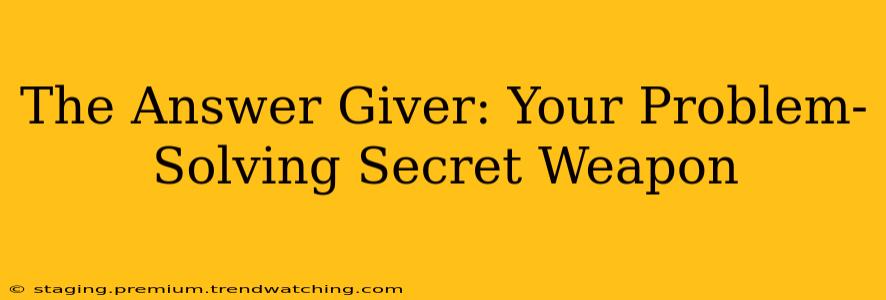In today's fast-paced world, finding quick, reliable answers is crucial. Whether you're a student tackling a complex assignment, a professional facing a challenging project, or simply someone curious about the world, having access to accurate and insightful information is paramount. This is where "The Answer Giver"—your problem-solving secret weapon—comes in. But what exactly constitutes this invaluable resource? It's not a single tool or website, but rather a strategic combination of approaches and resources tailored to efficiently solve your problems.
What is "The Answer Giver"?
"The Answer Giver" represents a holistic approach to problem-solving, encompassing a multi-faceted strategy: leveraging effective search techniques, critically evaluating sources, and employing a structured thought process. It's about mastering the art of information retrieval and analysis to find the most accurate, relevant, and helpful answers. This isn't about passively accepting the first result; it's about actively seeking and verifying information to ensure its validity.
How to Unleash Your Inner Answer Giver
Mastering "The Answer Giver" involves several key steps:
1. Defining Your Problem Clearly
Before diving into research, clearly articulate your problem. What exactly do you need to know? The more precise your question, the more targeted your search will be. Avoid vague terms; instead, use specific keywords and phrases that accurately reflect your query.
2. Strategic Search Techniques
This is where the real power of "The Answer Giver" lies. Employ advanced search operators like quotation marks (" "), minus signs (-), and Boolean operators (AND, OR, NOT) to refine your search results on search engines like Google, Bing, or specialized databases. Experiment with different search engines to broaden your reach.
3. Evaluating Sources Critically
Not all information is created equal. Critically evaluate your sources by considering:
- Authority: Is the source reputable? Is it written by an expert in the field?
- Accuracy: Does the information align with other credible sources? Are there any biases?
- Objectivity: Is the information presented neutrally, or is it slanted to promote a particular viewpoint?
- Currency: Is the information up-to-date? Is it relevant to the current context?
4. Utilizing Diverse Resources
Don't rely solely on one source. Consult a variety of resources, including academic databases, reputable news outlets, government websites, and subject-specific forums. Triangulating information from multiple sources will help ensure accuracy and completeness.
5. Synthesizing Information
Once you've gathered information, synthesize it to form a coherent understanding of your problem. Organize your findings, identify key themes, and draw conclusions. This involves critical thinking and the ability to connect disparate pieces of information.
Frequently Asked Questions (FAQ)
How can I improve my research skills to become a better "Answer Giver"?
Practice makes perfect! Regularly engage in research projects, even on topics outside your immediate needs. Experiment with different search techniques and critically evaluate the sources you encounter. The more you practice, the more refined your skills will become.
What are some essential tools for effective research?
Beyond search engines, tools like Zotero (for citation management), Google Scholar (for academic research), and specialized databases relevant to your field can significantly enhance your research process.
How do I deal with conflicting information from different sources?
When encountering conflicting information, further investigate the sources. Look for evidence to support each claim, consider the credibility and potential biases of the sources, and consult additional resources to resolve the discrepancy. If the conflict remains, acknowledge the uncertainty and proceed cautiously.
What if I can't find an answer to my question?
If your initial research yields no results, reformulate your question, broaden your search terms, or consider consulting an expert in the field. Remember, some problems require a more nuanced approach or specialized knowledge.
By mastering these techniques, you'll transform yourself into a highly effective "Answer Giver," capable of tackling any challenge with confidence and precision. This isn't just about finding answers; it's about developing a valuable skillset applicable to all aspects of life.

